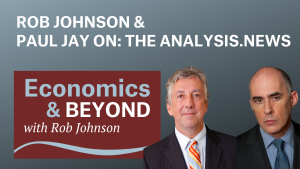As we look back at the causes and consequences of the Lehman Brothers collapse, an event that was emblematic of a broader failure of large complex financial institutions, we can ask several questions. What caused the calamity called Lehman? Did it leave any lasting damage to the financial system? What have we learned about the American political economy from this episode and its aftermath?
Simply speaking, the credit avalanche surrounding Lehman Brothers’ bankruptcy was the result of excessive leverage and the opacity of complex financial instruments. How that leverage and complexity came to fruition was a combination of hubris and “heads-I-win-tails-you-lose” incentives, and it was in large part related to the adverse feedback process in American politics where making money allows the purchase of favorable legislative and regulatory laxity, which begets more profit and more lobbying and more political intervention.
All of this was made to appear legitimate by so-called rocket scientists, who had convinced executives that they knew how to slice and dice and price these complex securities and that their statistical wizardry enabled their portfolios to run on razor-thin safety margins.
The crisis did appear to shake a lot of hubris out of top managements about their ability to control market risk. It demystified the rocket scientists. As a result, the private sector is in a more sober and cautious posture than it was in late 2007.
The other major concerns were related to the perverse incentives created by the awareness that some large complex financial institutions were too intertwined to resolve. The logic of knowing ex-ante that firms cannot be closed down because of the threat of cascading default created a toxic environment where banks deemed too significant to be allowed to fail were afforded funding that was cheaper because it wasn’t priced to reflect the possibility of default.
But cheaper funding enabled these firms to take more risk and leverage. Cheaper funding allowed them to out compete those firms that had no such conjectural guarantees. Their balance sheets blossomed and their market share increased. The Over The Counter (OTC) derivatives books of the top five banks had this embedded guarantee and as a result they controlled 95 percent of the derivatives markets.
This is a problem, and a demoralizing one, that has not been addressed despite all of the jaw music about the FSOC (Financial Services Oversight Committee). Too big to fail companies are too politically powerful in the wasteland of American money politics to be forced to submit to remedies that would make the system cohere. As Illinois Senator Richard Durban once said of the U.S. Senate, “The banks own the place”.
The lack of progress in the realm of TBTF, derivatives regulation, and most any other constraint that would hypothetically be placed upon a large complex financial institution is a reflection of the toxic incentives that politicians face in America and around the world. In Europe, the idea of restructuring sovereign debt has fallen behind other adjustments, including the propensity to cut spending in a depression or so-called austerity, in lieu of acknowledging that the existing debt overhang is nearly impossible to overcome.
A close study of the euro zone crisis also would reveal that it was large scale distortions in private credit allocation intermediated by European banks that was at the core of the problem. And still no banking union is forthcoming in Europe. As Andrew Haldane, of the Bank of England and the Institute for New Economic Thinking’s Advisory Board, has shown, the financiers have been banking on the state in myriad ways, and they do not want to give it up for the sake of systemic integrity or legitimacy.
In 2008, the polluters did not pay and it is hard to see how they will if a crisis occurs again. The accompanying despondency about the ability to govern these financial behemoths gives governing a bad name and fuels anti-government groups like the Tea Party.
From the vantage point of five years out, we see a demoralized populous that has been told by the U.S. attorney general that big banks are too systemically important to govern or punish. We see little or no progress on TBTF or bringing OTC derivatives out of the dark. We see a rule making process dominated by the lobbyists and lawyers for the financial institutions. And we see money politics still dominating in Washington, especially when it comes to the financial sector
This is not a healthy state of affairs. When the central nervous system of an organism is damaged the whole body enters dysfunction. The financial system is the central nervous system of our economy and society. When the leading institutions, their regulators, and the entire legislative framework live under a cloud of suspicion there can be no broad based rekindling of trust. As a result we all suffer. Rage at the big banks may be justified, but it is hardly a remedy for what ails us.
Looking back five years out, we did, it seems, learn that some of the received wisdom in financial theory was not true. But we have yet to capitalize on these insights. There is still a long way to go.






